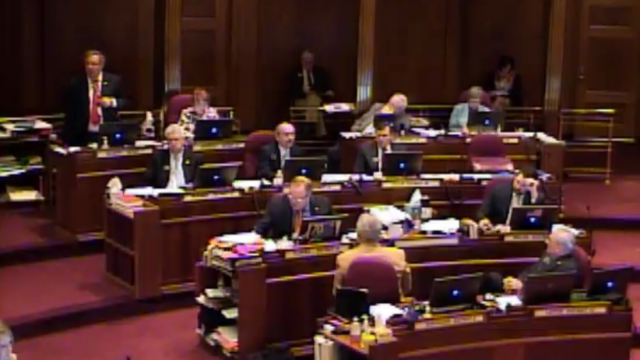Video: North Dakota Senate Says No To Income Tax Cuts

The process started in the state House with one proposal calling for the elimination of the income tax, an $820 million reduction in revenues. But ultimately the House went with the smallest income tax bill before them, HB1223 which as amended provided $152 million in income tax cuts ($100 million for personal, $52 million for corporate).
But then the Senate got ahold of the bill.
Initially the Senate amended the tax cut bill down to $125 million. Then down to $108 million. By the time the bill reached the floor of the Senate it was a tiny $33 million tax cut (5 percent for personal and 5 percent for corporate) and wouldn’t go into law until the second year of the biennium, 2017.
[mks_pullquote align=”right” width=”300″ size=”24″ bg_color=”#000000″ txt_color=”#ffffff”]…personal income tax collections have increased 59 percent even as we’ve cut rates 49.5 percent. With corporate taxes, they’ve more than doubled even as we reduced them 39.4 percent.[/mks_pullquote]
Yet the Senate didn’t have an appetite for even that modest reduction. The bill failed on a 13-33 vote.
Not everyone on the Senate floor was pleased. “The most responsible thing we can do in a down economy…is cutting taxes and reining in spending,” Senator Joe Miller (R-Park River) said during the floor debate. “I’m hearing the exact opposite from his chamber right now.”
Indeed he was. Senator Tim Mathern (D-Fargo) rose to tell his fellow Senators that they should focus on spending not tax cuts which, he claims, none of his constituents have said they wanted.
This ends a trend of income tax cuts passed by the Legislature. According to Senate Appropriations Committee Chairman Ray Holmberg (R-Grand Forks), the legislature has decreased the personal income tax by 49.5 percent and the corporate tax rate by 39.4 percent since 2009. Those aren’t insignificant reductions.
What’s interesting is that as I write this the Office of Management and Budget has released their monthly revenue numbers. In the 2013-2015 biennium to date personal income tax collections are up 12.3 percent (more than $92 million) while corporate income tax collections are up 24.2 percent (more than $68 million) since the last biennium.
Comparing those numbers to the same point in the 2009-2011 biennium, back when the Legislature was kicking tax cuts into gear, personal income tax collections have increased 59 percent while corporate income tax collections have increased 106 percent.
Meaning that personal income tax collections have increased 59 percent even as we’ve cut rates 49.5 percent. With corporate taxes, they’ve more than doubled even as we reduced them 39.4 percent.
The oil price situation is troubling, to be sure and lawmakers should be cautious. But as Senator Miller notes, the caution should probably be exercised in the area of spending not tax cuts.




